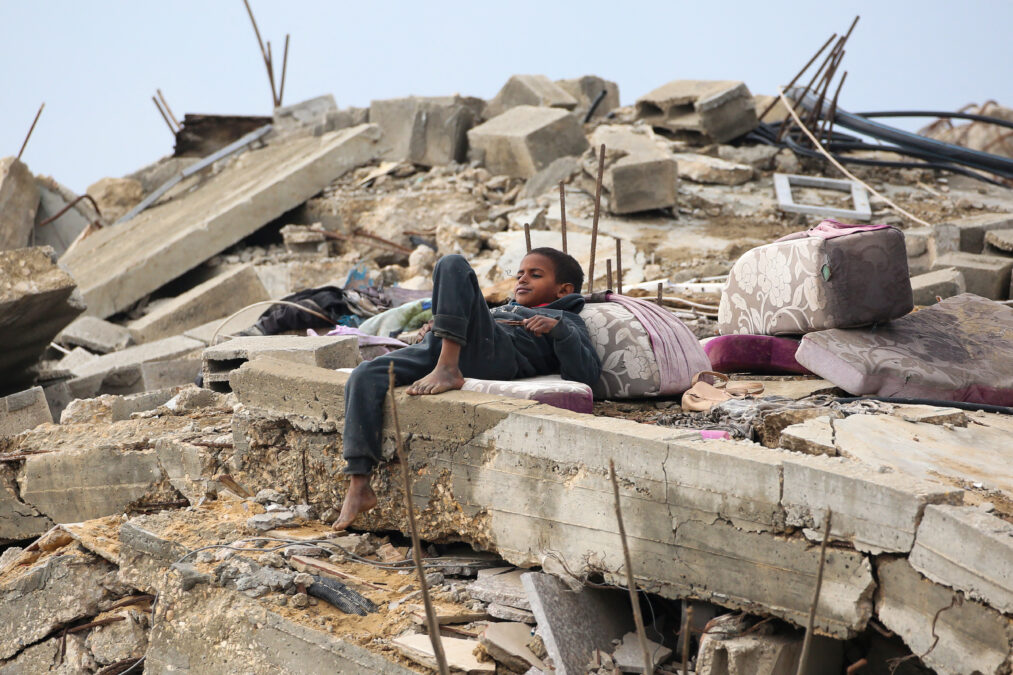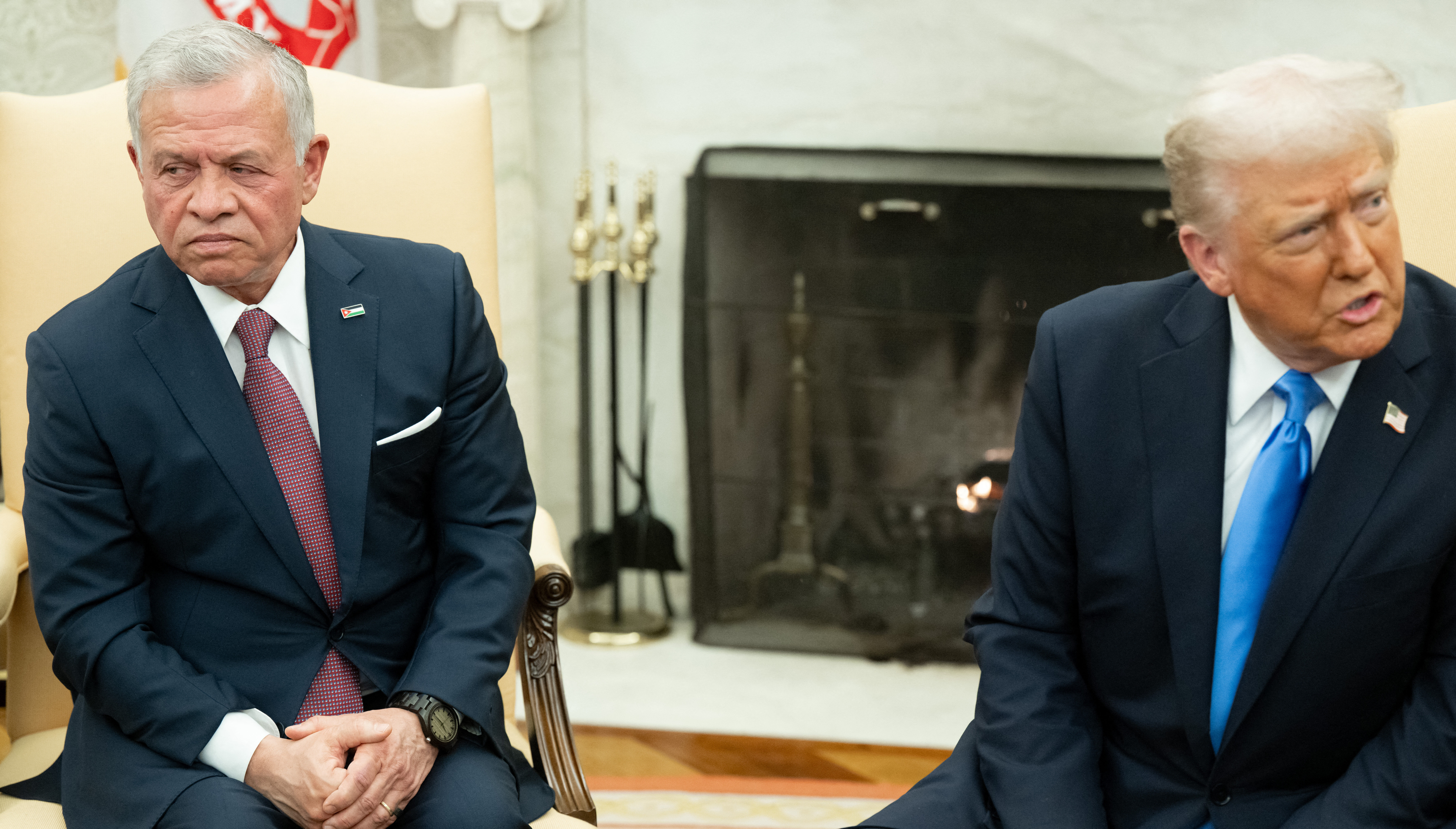Cairo, Egypt – Egypt plans to “present a comprehensive vision for the reconstruction” of the Gaza Strip that ensures Palestinians remain on their land, the Egyptian foreign ministry said late Tuesday.
The statement came a day after US President Donald Trump said he could “conceivably” halt aid to Egypt and Jordan if they refuse to cooperate with his plan to take over the Gaza Strip and displace its population to their countries.
The foreign ministry said Egypt “hopes to cooperate” with Trump’s administration on the matter, with the goal of “reaching a fair settlement of the Palestinian cause”.
It said its plan would provide for the reconstruction of Gaza “in a clear and decisive manner that ensures the Palestinian people stay on their land, and in line with the legitimate and legal rights of this people”.
During a meeting with Trump in Washington on Tuesday, Jordan’s King Abdullah II had said Egypt would present a plan that Arab leaders would discuss at coming talks.
Egyptian President Abdel Fattah al-Sisi — who exchanged invitations for state visits with Trump last month, which have not yet been scheduled — urged on Tuesday the reconstruction of Gaza “without displacing Palestinians”.
During a phone call with Danish Prime Minister Mette Frederiksen, Sisi “stressed the necessity of starting the reconstruction of the Gaza Strip… without displacing Palestinians and in a way that ensures the preservation of their rights… to live on their land”.
Sisi also said the establishment of a Palestinian state was “the only guarantee for achieving lasting peace” in the region, according to a statement from his office.
Trump has proposed the US taking over Gaza and clearing Palestinians out, envisioning rebuilding the devastated territory into the “Riviera of the Middle East” after resettling Palestinians elsewhere, namely Egypt and Jordan.
His remarks have sparked a global backlash and Arab countries have condemned the proposal, insisting on a two-state solution of an independent Palestinian state alongside Israel.

On Monday, Egypt’s foreign ministry rejected “any compromise” that would infringe on Palestinians’ rights, including their right to “remaining on the land”, in a statement issued shortly after Foreign Minister Badr Abdelatty met with his US counterpart Marco Rubio in Washington.
Egyptians furious over Trump’s plan
Egyptians reacted with fury on Tuesday to US President Donald Trump’s plan to displace Palestinians from Gaza to Egypt and Jordan, while downplaying his threat to cut aid to both countries if they refuse.
The state-owned Al-Ahram newspaper ran a front-page headline declaring “Egypt urges the world to end historical injustice against the Palestinian people”, while the private daily Al-Masry Al-Youm wrote, “Palestinian anger: Gaza is not for sale”.
On X, the hashtag “on the shoe” — a common Egyptian phrase meaning “we could not care less” — began to trend in response to what many saw as an attempt at intimidation.
The phrase can be traced back to a historic speech by late president Gamal Abdel Nasser, who dismissed US aid threats during Egypt’s wars with Israel.
On Monday, a strongly worded statement from Egypt’s foreign ministry rejected “any compromise” that could infringe on Palestinians’ rights, including to remain on their land.
The statement followed a meeting in Washington between Egypt’s foreign minister Badr Abdelatty and his US counterpart Marco Rubio.
During a phone call with the Danish prime minister on Tuesday, President Abdel Fattah al-Sisi said that the establishment of a Palestinian state is “the only guarantee for achieving lasting peace” in the region.
The Egyptian leader also called for the reconstruction of Gaza “without displacing” its residents, according to a statement from his office.
Trump, speaking on Monday, said the United States could “conceivably” halt assistance to Egypt and Jordan unless they agree to take in Palestinians from Gaza — a proposal Cairo and Amman have repeatedly rejected.
‘An act of war’
The US provides its regional ally Egypt with around $1.3 billion in military aid annually, making it one of the country’s largest foreign donors.
According to US government data, Egypt received roughly $1.5 billion in both military and economic assistance from the United States last year.
Hussein Haridi, a former diplomat and assistant foreign minister, downplayed the significance of US aid, arguing that it would not sway Egypt’s position on Gaza.
“This small amount (about $200 million) in economic aid will not affect the Egyptian economy,” Haridi told AFP.
“Regardless of its impact, we will not bow to Trump’s threats,” he said.
Haridi also said that Trump had little understanding of “the true character of Egyptians” and the country’s historical role in defending Arab interests and in particular the Palestinian cause.
“We do not care about Trump’s threats. Egypt is fully prepared to confront them and these threats will backfire on US interests in the region.”
“This is not just Sisi’s stance or the Egyptian government’s stance — it is the stance of the Egyptian people,” he added.
Gamal Bayoumi, a former diplomat and assistant foreign minister, meanwhile, told AFP that Egypt has made its stance clear: any attempt to force Palestinians out of Gaza “will be considered an act of war”.
Bayoumi added that Egypt was well prepared for any measures Washington might take, including a potential halt to financial assistance.
‘Egypt will stand firm’
Among ordinary Egyptians, the Trump plan provoked outrage.
“After bombing and killing them, they now want to displace them?” said Samir Gomaa, a 71-year-old garage owner in Cairo.
“This is Palestinian land. Who in their right mind sells land that isn’t theirs and turns it into a tourist project?,” Gomaa told AFP.
Despite Egypt’s economic struggles, including soaring inflation and mounting debt, many citizens expressed support for Sisi’s stance.
“Our president is a hero for saying no, even though we’re struggling with inflation,” said Mohamed Abdel Tawab, 53, a paper trader.
“The Arab world will rebuild Gaza and Egypt will stand firm,” he said.
Since early in the Gaza war, which began in October 2023 with Hamas’s attack on Israel, officials and lawmakers in Egypt have repeatedly warned against any attempts to alter the region’s demographics, seeing it as a national security threat.
Jordan king pushes back
President Donald Trump on Tuesday doubled down on his idea of exiling Palestinians and placing a rebuilt Gaza under “US authority” but faced pushback from visiting Jordanian King Abdullah II.
“I reiterated Jordan’s steadfast position against the displacement of Palestinians in Gaza and the West Bank. This is the unified Arab position. Rebuilding Gaza without displacing the Palestinians and addressing the dire humanitarian situation should be the priority for all,” Abdullah said on social media after the talks.
However, he told Trump that Egypt was working on a plan for how countries in the region could “work” with Trump on his shock proposal.
The Jordanian monarch also appeared to offer a sweetener to Trump, who the day before the visit floated the possibility of halting US aid to Jordan if it did not take in refugees.
“One of the things that we can do right away is take 2,000 children, cancer children who are in a very ill state. That is possible,” Abdullah said as Trump welcomed him and Crown Prince Hussein in the Oval Office.
Trump replied that it was “really a beautiful gesture” and said he didn’t know about it before the Jordanian monarch’s arrival at the White House.
The US leader stunned the world when he announced a proposal last week for the United States to “take over” Gaza, envisioning rebuilding the devastated territory into the “Riviera of the Middle East” — but only after resettling Palestinians elsewhere, with no plan for them ever to return.
Abdullah urged patience and said that Egypt was coming up with a response and that Arab nations would then discuss it at talks in Riyadh.
“Let’s wait until the Egyptians can come and present it to the president and not get ahead of ourselves,” Abdullah said.
Trump retreated from his previous talk of an aid halt to Jordan and Egypt, saying: “I don’t have to threaten that. I do believe we’re above that.”
‘Tough guy’
Trump, however, kept pushing his plan to “own” Gaza and place it under “US authority,” despite the fact that it is home to more than two million Palestinians who want their own sovereign state.
“We don’t have to buy. We’re going to have Gaza,” Trump said.
“We’re going to take it, we’re going to hold it, we’re going to cherish it.”
But Trump, who made his fortune as a real estate tycoon did however deny that he would seek to personally develop property in Gaza. “No. I’ve had a great career in real estate,” he said.
The meeting came as the Gaza ceasefire appears increasingly fragile, after Trump warned on Monday that “all hell” would break out if Hamas fails to release all hostages by Saturday.
Trump said he doubted that the Palestinian militant group would abide by the ultimatum — but played down the risk of a longer threat to efforts to create a lasting peace between Israel and Hamas.
“It’s not going to take a long time,” Trump said. “A bully is the weakest person, and they’re bullies. Hamas is bullies.”
The Jordanian king and crown prince earlier met Trump’s national security advisor, Mike Waltz.
King Abdullah is a key US ally but last week rejected “any attempts” to take control of the Palestinian territories and displace its people.
Egyptian President Abdel Fattah al-Sisi, who is expected to visit the White House later this week, urged on Tuesday the reconstruction of Gaza “without displacing Palestinians.”
Analysts say the issue is an existential one for Jordan in particular.
Half of Jordan’s population of 11 million is of Palestinian origin, and since the establishment of Israel in 1948, many Palestinians have sought refuge there.
In 1970 in what became known as “Black September,” clashes erupted between the Jordanian army and Palestinian groups led by the Palestine Liberation Organization (PLO).
It resulted in the expulsion of those groups.
But Jordan is also keenly aware of the economic pressure Trump could exercise. Every year, Jordan receives around $750 million in economic assistance from Washington and another $350 million in military aid.
On social media after the Trump talks, Abdullah stressed that his “foremost commitment is to Jordan, to its stability and to the well-being of Jordanians.”








